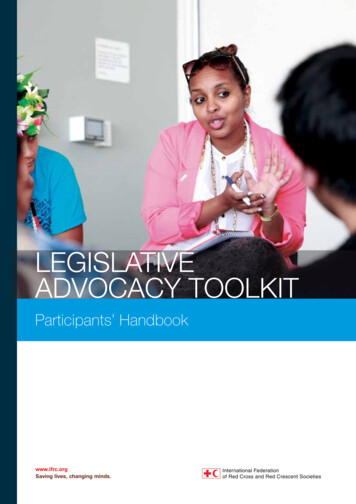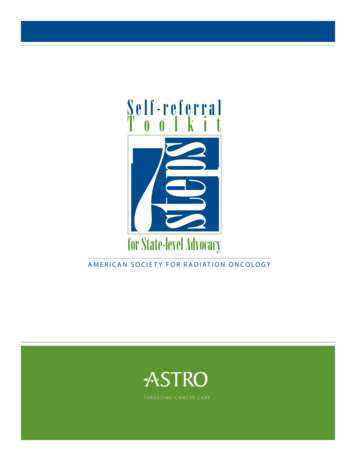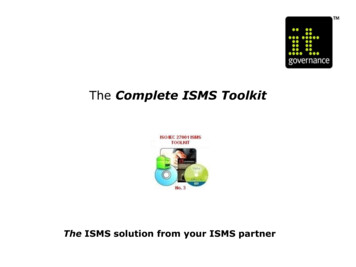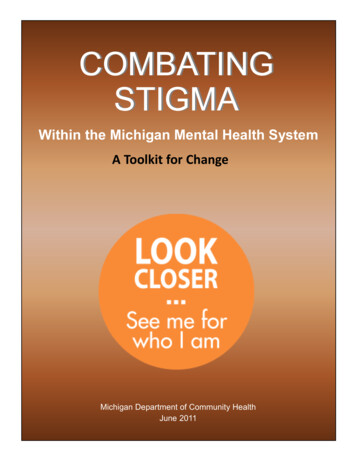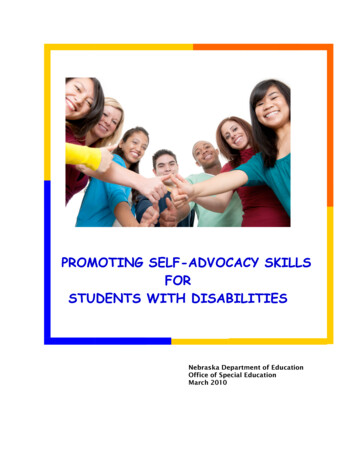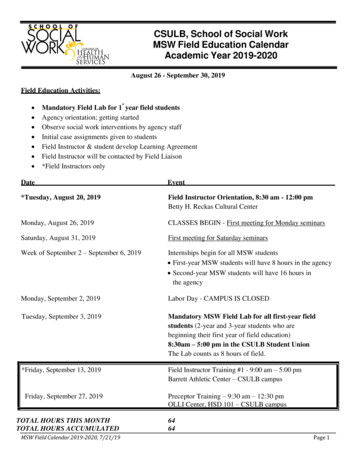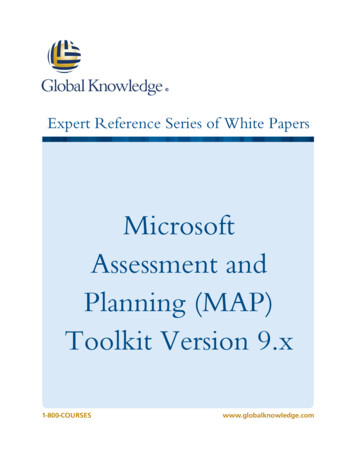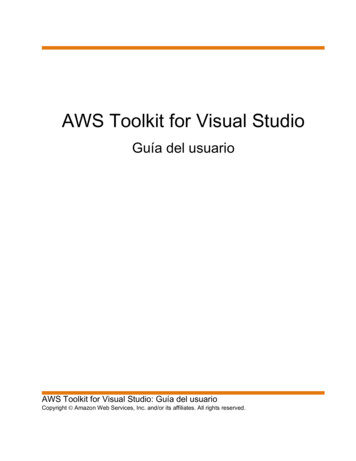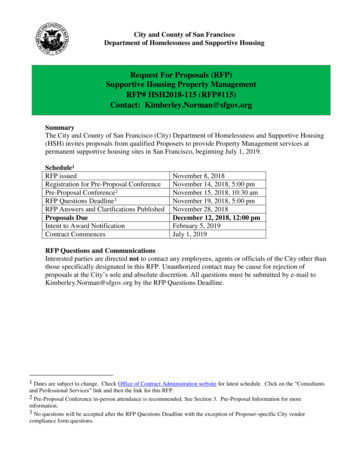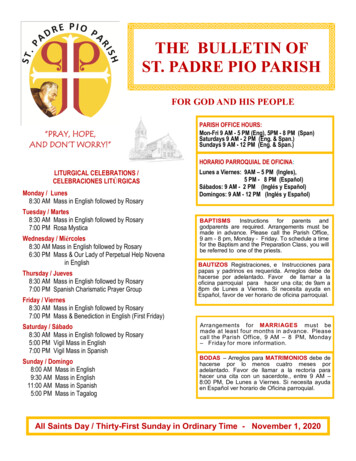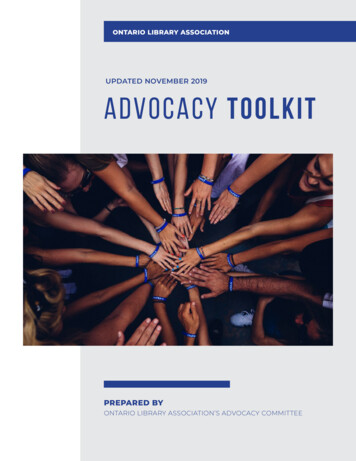
Transcription
ONTARIO LIBRARY ASSOCIATIONUPDATED NOVEMBER 2019Advocacy ToolkitPREPARED BYONTARIO LIBRARY ASSOCIATION’S ADVOCACY COMMITTEEPAGE 1 ADVOCACY TOOLKIT
TABLE OF CONTENTSSection 1: Relationship BuildingSection 4: CommunicationsRelationship Building . . . . . . . . . . . . . . . . . . . . . . . . . . . . 7Know your audience and align yourmessaging with their priorities . . . . . . . . . . . . . . . . . . . 8Demonstrating Library Impact . . . . . . . . . . . . . . . . . . . 9TEMPLATE Advocacy Issue Worksheet . . . . . . . . 10HOW TO: Make the most of social media . . . . . . . . 20HOW TO: Pitch a story to local media . . . . . . . . . . . 22TEMPLATE Pitch Email to Local Media . . . . . . . . 23Section 2: Meeting withBackground: How Libraries are Funded . . . . . . . . . 24School Libraries . . . . . . . . . . . . . . . . . . . . . . . . . . . . . . . . 24Public Libraries . . . . . . . . . . . . . . . . . . . . . . . . . . . . . . . . . 24First Nations Public Libraries . . . . . . . . . . . . . . . . . . . . 25Academic Libraries . . . . . . . . . . . . . . . . . . . . . . . . . . . . . 25Political RepresentativesMeeting with political representatives . . . . . . . . . . . 12HOW TO: Make the Most ofInformal Meetings and Encounters . . . . . . . . . . . . . 12HOW TO: Request a Meeting withYour Local Political Representative . . . . . . . . . . . . . . 14TEMPLATE Local RepresentativeMeeting Request Email . . . . . . . . . . . . . . . . . . . . . . . . 16TEMPLATE Crafting a Value Statement . . . . . . . . 17TEMPLATE Elevator Pitch . . . . . . . . . . . . . . . . . . . . . 17Section 6: ResourcesAdvocacy Resources . . . . . . . . . . . . . . . . . . . . . . . . . . . 26Public library impact research . . . . . . . . . . . . . . . . . . . 26School library impact research . . . . . . . . . . . . . . . . . . 27Academic library impact research . . . . . . . . . . . . . . . 28TemplatesSection 3: Advocating in YourCommunityAdvocating in your community . . . . . . . . . . . . . . . . . 18The “Ladder of Engagement” . . . . . . . . . . . . . . . . . . . 19Engagement for front-line workers . . . . . . . . . . . . . . 19PAGE 2Section 5: Background Advocacy Issue Worksheet . . . . . . . . . . . . . . . . . . . . . 10Local Representative Meeting Request Email . . . 16Crafting a Value Statement . . . . . . . . . . . . . . . . . . . . . . 17Elevator Pitch . . . . . . . . . . . . . . . . . . . . . . . . . . . . . . . . . . . 16Pitch Email to Local Media . . . . . . . . . . . . . . . . . . . . . . 23ADVOCACY TOOLKIT
OntarioLibraries:AdvocacyToolkitPurposeThis toolkit was created to increase the capacity of OLA members,from all library sectors, to advocate for their libraries and to broadenthe community of library advocates in Ontario. This toolkit aimsto provide guidance as to how to advocate effectively and link toadditional resources for members who wish to learn more.VisionOLA members are informed and empowered to secure greatersupport for and understanding of libraries, and in line with the OLAGovernment Relations plan.AcknowledgementsContent in this toolkit has been adapted from a number of resources,including the Canadian Association of Public Libraries (CAPL)Library Advocacy Now! Toolkit (2011), Wendy Newman’s AdvocacyUnshushed MOOC (2015), the Ontario Non-Profit Network’sElections Toolkit (2018), and the Ontario Library AssociationsElections Toolkit (2018).It was prepared by members of Advocacy Committee and OLA staff,with gratitude to members of OLA’s Councils and Board of Directors,the Special Libraries Committee, the Indigenous Task Group, as wellas Wendy Newman, Margie Singleton and Kate Johnson-McGregorfor their feedback and guidance.Advocacy Committee MembersCo-Chair: Dana Vanzanten (Public Library)Co-Chair: Jesse Carliner (Academic Library – University)Sherry Lawson (First Nation Public Library)Dawn Telfer (School Library)Jason Bird (Academic Library – College)David ThornleyRichard Reid, OLA President 2019Kerry Badgely, OLA President 2018andEx-Officio membersShelagh Paterson, Executive Director, OLASarah Roberts, Advocacy & Research Officer, OLASomething to add?If you have questions, comments, or ideas for topics notcovered in this toolkit, you can always fill in this feedbackform!PAGE 3 ADVOCACY TOOLKIT
INTRODUCTIONWhat is advocacy?No matter what type of library you are involved with – Academic,Public, School, Special – support from your local stakeholders,decision-makers, and leaders is essential to ensuring that you andyour library have the resources and connections you need.Advocacy is about: Building positive relationships with stakeholders, decisionmakers and local leaders; Promoting your library as an important asset to yourcommunity, school, or institution; and Raising awareness about what your library needs and theissues you face.Why do libraries need advocates?Though libraries continue to be viewed positively by most users,community members and stakeholders, libraries cannot liveon love alone! It is important to continue to demonstrate thevalue and relevancy of your libraries – whether to government,within school boards, within your unions, within your institutions,or across your communities.Advocacy is a planned,deliberate, sustainedeffort to raise awarenessof an issue or issues.Advocacy is thusan ongoing processwhereby support andunderstanding are builtincrementally over anextended period oftime.Canadian Associationof Public Libraries(CAPL), LibraryAdvocacy Now!ToolkitYou mean this is my job?Yes, whether you are a library CEO, front-line worker, school librarystaff member, teacher-librarian, solo-librarian, or self-employed,everyone has a role to play in advocating for your libraries. Advocacywill look different for individuals in different contexts.Some examples of advocacy:1. Local public and school libraries collaborating to meet withthe local Member of Provincial Parliament (MPP) to talkabout the role of the libraries in the community.2. Prepare a report highlighting the impact of work in the librarylearning commons to advance school goals and meet withadministration3. Front-line workers sharing outcomes and positive impactstories in conversations at work and in the community.4. Encouraging your local City Council to pass a resolution insupport of an increase in provincial funding for libraries.5. Sharing stories on your library’s social media of the essentialrole that the library is playing in your community.PAGE 4 ADVOCACY TOOLKIT INTRODUCTION
INTRODUCTIONYour Association’s role in advocating forlibrariesYou and your library are not alone in your advocacy efforts.Associations like the Ontario Library Association (OLA) have a role toplay in supporting advocacy at the provincial level.Currently, OLA is working with provincial partners like theFederation of Ontario Public Libraries (FOPL), The Association ofLibrary Consultants and Coordinators of Ontario (TALCO) and othersto support advocacy issues impacting libraries.OLA has a V.I.P. approach to advocacy: help members demonstratethe Value of libraries, Influence decision-making, and positivelyPosition libraries and the people who work for them.TIP: Advocacy is along-term processof relationshipbuildingAdvocacy relies onstores of trust built upover time. The best wayto accomplish this isto develop a personal,convivial relationshipwith members of yourcommunity and withdecision-makers.What are we doing?OLA and FOPL work with a government relations firm to developlong-term relationships with decision-makers at a provincial level.In consultation with the library sector, we are working together todevelop strategic advocacy priorities. Some examples of OLA’sprovincial advocacy work include: Coordinating biannual Library Day at Queen’s Park; Coordinating advocacy around Ontario’s annual provincialbudget process, including meetings with provincial Ministersof Culture, Tourism and Sport and Education, submissions tothe Ministry of Education’s 2019-20 Education Funding GuideConsultation, and coordinating OLA members’ meetings inlocal ridings to build province-wide support; Exhibiting at meetings and conferences such as Associationof Municipalities of Ontario (AMO), Administrators of MediumSized Public Libraries of Ontario (AMPLO), Administrators ofRural and Urban Public Libraries of Ontario (ARUPLO), Chiefsof Ontario (COO), Rural Ontario Municipalities Association(ROMA), and more; Conducting research on the impact school libraries have onstudent success; And much more!PAGE 5 ADVOCACY TOOLKIT INTRODUCTION
INTRODUCTIONSpeaking with a clear and unified voiceRemember: If you are engaging in advocacy for libraries with MPPsor other provincial stakeholders, it is important that libraries speakwith a clear and unified voice. The Ontario Library Association workswith the Federation of Ontario Public Libraries (FOPL), libraries andour government relations firm to develop long-term advocacy plansfor school and public libraries. As you undertake advocacy at thelocal level, you can help by staying connected.1. Please ensure that any local outreach you are doing alignswith OLA and FOPL’s ongoing messaging. You can learnmore about our latest government relations activities bychecking out our website. When in doubt, reach out to us.2. Share your successes. Do you have a great local advocacyinitiative that other libraries could benefit from? Share yoursuccess with OLA and the sector.3. Share your concerns. Have an advocacy concern that OLAand FOPL are not currently addressing? Let us know!PAGE 6 ADVOCACY TOOLKIT CanadianFederation ofLibrary Associations(CFLA)For advocacy issueswith a national scope,the Canadian Federationof Library Associations/Fédération canadiennedes associations debibliothèques (CFLAFCAB) is our voice.The Federation wasestablished to facilitatecollaboration in libraryadvocacy at the federallevel. OLA is a member ofCFLA.INTRODUCTION
RELATIONSHIP BUILDINGDecision-makers are much more likely to be receptive to youradvocacy efforts if you are already known and trusted by them. It isimportant to invest the time developing a personal relationship withmembers of your community and with decision-makers.The pitfalls of Sloganeering“In the library community, we talk a lot about the need foradvocacy, and we have assembled great ‘talking points’and slogans. We talk about the library as the ‘heart of thecommunity’ or the ‘crossroads of the university.’ We say thatthe library is the preschool child’s door to reading and learning.We like to remind people that libraries are about more than justbooks and journals that go in and out. We present the schoollibrary as the way to achieve better standardized test scores,reminding them that, according to research, in the clear andcompact sound bite of the American Association of SchoolLibraries, ‘Student achievement is the bottom line.’ We tweetand blog and email these lines, all of which are true, into a busyand preoccupied world, and we hope some will take root.Learn More:Learn: Library AdvocacyUnshushed MOOC(Massively Open OnlineCourse). 2015. WendyNewman.Watch: Influence. 2012.Robert Cialdini.Read: Principles ofPersuasion. 2006. RobertCialdini.We’re making a big mistake if we assume these slogans andgestures are going to safeguard the future of libraries andlibrarianship. They are simply promotional communications.In the marketing business, as my colleague Ken Haycock says,this scattershot approach is referred to as ‘spray and pray’ – aphrase marketers borrowed from the military. That is, send outas many communications as possible, and hope they will takeroot somewhere. It doesn’t work in marketing, and it won’t workfor us and for our communities, either. It’s not focused, it’s notstrategic, and it doesn’t build relationships with the peoplein the community who make the decisions about libraries orinfluence those who do.”— Wendy Newman, Library Advocacy Unshushed (2015)PAGE 7 ADVOCACY TOOLKIT RELATIONSHIP BUILDING
RELATIONSHIP BUILDINGKnow your audience and align yourmessaging with their prioritiesTip: Get HelpWhether you are doing individual outreach or developing a socialmedia campaign, having a clear picture of your audience, theirneeds and their interests is essential. Ask yourself first:If you are planning onundertaking a large scaleadvocacy campaign, youmay consider enlistingthe services of anoutside agency, such asa government relationsfirm, marketing agencyor consultant. These canhelp with the planningand implementation andincrease the impact ofyour advocacy.1. Who is your target audience? Who do you want to reach?2. What do you know about them? What are their priorities?What are their interests?3. How does or can the library support these priorities?Get to know your decision-makers:Each library sector has a different set of stakeholders and decisionmakers. Some possibilities for your context may be: Public libraries à your local MPP, Municipal Councillor, BandCouncil, or other local leader. School libraries à your principal, superintendent, school boardtrustees, professional organizations, unions, subject matterassociation. Academic libraries à your institution’s administration.When connecting at amunicipal level, publiclibraries can engage withtheir municipal associationto support local advocacyefforts. For special libraries à your director, your client, etc.If you are advocating for your library within your institution, like auniversity or college library, or a special library, get to know youradministration’s strategic priorities. Find ways that the library can oralready does align its offerings with those priorities.For school libraries this includes the latest Ministry curriculumdocuments as well as your school or school boards achievementplan.Similarly, if you are seeking to increase local community supportfor your library, think about the decision-maker you are trying toreach. This may be your local MPP or Municipal Council, members ofthe public or a community organization.Association ofMunicipalities of Ontario(AMO)Federation of NorthernOntario Municipalities(FONOM)L’Association françaisedes municipalités del’Ontario (AFMO)Northwestern OntarioMunicipal Association(NOMA)Ontario Small UrbanMunicipalities (OSUM)Rural Ontario MunicipalAssociation (ROMA)PAGE 8 ADVOCACY TOOLKIT RELATIONSHIP BUILDING
RELATIONSHIP BUILDINGDemonstrating Library ImpactResearch and evidence highlighting the impact of your library is agreat way to support your advocacy efforts. Evidence can look likemany things:TIP:See pages 26 to 28 forresearch on the impact oflibraries. a report on the social return on investment of your library (seepage 27 for examples) highlights from recent program evaluations, stories and testimonials from library users or partners about theimpact of the library statistics showing the use of library programming, services andcollections and moreEvidence adds weight to your advocacy efforts, helping todemonstrate the real impact of library programming and services inyour community.TIP: Many freeresources cansupport inmeasuring theimpact of yourprogramming andservices: CSI ImpactDashboard Project Outcome Valuing NorthernLibraries Toolkit(Ontario LibraryService – North withNordik Institute)Any many more!Whatever the priority,the library has a roleto play:PAGE 9 Increasing student retention,Improving math scores,Fostering evidence-basedservice-delivery,Increasing community safety,Engaging at risk youth,And much more.ADVOCACY TOOLKIT Align your messagingto respond to thepriorities of your localdecision-makers.RELATIONSHIP BUILDING
TEMPLATE: ADVOCACY ISSUE WORKSHEETAdvocacy Issue WorksheetRemember! If you are engaging in advocacy for public libraries with MPPs or other provincialstakeholders, it’s important that libraries speak with a clear and unified voice.Please ensure that any local outreach you are doing aligns with OLA and FOPL’s ongoing messaging.The Ontario Library Association works with the Federation of Ontario Public Libraries, OLA and FOPLmembers, and a government relations firm to develop long-term advocacy plans for public libraries.When in doubt, reach out. Have an advocacy concern that OLA and FOPL aren’t currently addressing?Connect with Sarah Roberts, Advocacy and Research Officer at the Ontario Library Association, to tell usabout it: sroberts@accessola.com.If you are working on an advocacy issue at a local level that does not have a provincial focus, you canuse these questions to plan your own advocacy response.1. What is the issue?2. Issue breakdown:a. Why is it important (not just to us but to our audience)?b. Who is being impacted?c. What are the challenges as a result of this issue?d. When did this start?Template Continues on Next PagePAGE 10 ADVOCACY TOOLKIT TEMPLATE
TEMPLATE: ADVOCACY ISSUE WORKSHEET3. What data or research is there around this issue? See the resources section for some good resourcesto get you started.4. What is the preferred outcome?5. Who are your partners?6. Who are decision-makers/stakeholders?7. What does success look like? How will your advocacy efforts be evaluated?PAGE 11 ADVOCACY TOOLKIT TEMPLATE
MEETING WITHPOLITICAL REPRESENTATIVESFor some types of libraries, meeting with your local representative,whether they are your MPP, Municipal Councillor, Band Council,School Board Trustee or other representative is a great way to build arelationship and to educate them on the positive impacts of librariesand issues confronting the sector.In general, your representatives want to get to know the importantstakeholders in their communities – that’s you – and will appreciateyour perspective and the opportunity to learn about how they canbe a champion for you.Your first meeting with a new political representative should be ameet and greet – take some time to ask questions, get to know theirinterests and values.As you introduce yourself and share the role that your library plays inthe community or school, be sure to highlight the ways in which thelibrary supports the priorities that are important to the person withwhom you are meeting. This might include the programs that yourun, the resources you make available to your community, and theimpact on their constituents.TIP: Get creativeTIP: People dothings for their ownreasons, not ours:In order to be an effectiveadvocate, it is important toadapt your message to theconcerns of your audience.Take some time to learnabout your local leaderand their priorities, valuesand interests. How doesyour library align with theirpolitical and/or personalpriorities? As you start tobuild your relationshipwith local decision-maker,focus on how the library iscontributing solutions andvalue in areas you knoware already important tothe leaders in your area.Inviting a local leader to participate in a story time or an event isa memorable and fun introduction to your library. It is also a greatphoto op, allowing both of you to share on social media.HOW TO: Make the Most of InformalMeetings and EncountersIf you run into your local representative at your library, school, or alocal event, be sure to take the opportunity to engage and educatethem on the role libraries are playing in your community.You can advocate for your institution and your profession bypreparing a clear and engaging elevator pitch. Practice your pitchso you’re always ready to take advantage of a chance to make yourcase.TIP:See page 17 for atemplate on Crafting aValue Statement andElevator PitchThese informal meetings are invaluable for fostering a positive,personal relationship with an individual who may become your nextrepresentative on your local/municipal Council or the School Board.Be sure to get their contact information and follow up afterwards.Make sure they know you’re always available to answer questions!PAGE 12 ADVOCACY TOOLKIT MEETING WITH POLITICAL REPRESENTATIVES
MEETING WITH POLITICAL REPRESENTATIVESDOWhat does it meanto be non-partisan? Consult your organization’s leadership: Before youengage your library in any advocacy activity, be sure thatyour leadership is on board and that your message isconsistent with the position of your organization. Stay focused: We are most effective when we have a clearand unified message on the necessity of increased supportfor libraries.The Ontario Library Association works with the Federationof Ontario Public Libraries and a government relations firmto develop long-term advocacy plans for libraries. Theseadvocacy goals and plans are developed with Ontario’slibrary sector. Please ensure that any local outreach you aredoing aligns with OLA and FOPL’s ongoing messaging. Be positive: Libraries are providing critical services to yourcommunity, school or institution. As you engage, positionlibraries as contributing solutions and value. Organize and be inclusive: A well-organized meeting orevent should be one where everyone is welcome. Whenappropriate, think about what people with barriers toparticipation might need – and how you can help addressthese.Partisan political activity is thedirect or indirect promotion ofa political party, or the direct orindirect opposition to a politicalparty.As representatives of the librarysector, we need you to talk aboutand share information aboutour issues – which do not favouror criticize a specific politicalparty – and foster discussionabout these important matters.We believe strongly – and wecan demonstrate – that librariespositively impact a broad crosssection of Ontarians in everycommunity across the province.As a sector, we have and willcontinue to work collaborativelyand constructively withrepresentatives of all politicalparties to achieve meaningfulchange benefitting our librariesand communities. Prepare: Do your homework. Your impact will be mostsignificant when you’re able to connect our overallmessaging with your local perspective and insight. Get social: Don’t forget to take a picture to share on socialmedia.Remember: social media is a tool for engagement, notonly promotion. Be creative and don’t be afraid to engagein dialogue with your community and political leaders.See the section on Social Media below for more tips onusing social media for advocacy. Thank you: After a meeting or event, send thank-youletters, including a contact person for further questions.DON’T Ask for priorities that are outside the scope of government.See the Resources section for information on how eachlevel of government impacts each library sector.In ridings that span alarge geographical, itmay not practical for allstakeholders to participatein in-person meetings.Designate a representativeto meet in the communityeasiest for you MPP toaccess – often where he orshe lives or works.Where possible, consideropportunities to includestakeholders in yourmeetings remotely –through teleconferenceand video conferencesolutions. Be combative Make partisan statementsPAGE 13 ADVOCACY TOOLKIT MEETING WITH POLITICAL REPRESENTATIVES
MEETING WITH POLITICAL REPRESENTATIVESHOW TO: Request a Meeting withYour Local Political Representative1. Ask Ask in person, call, email, or send a letter introducing yourself,your role and the importance of libraries. Request a meeting to discuss further. Negotiate a date, time, and location for the meeting. Let thestaff know how much time you would like (shorter meetings arealways more practical than longer ones) and be prepared toshorten the session if need be.2. Prepare Once the meeting is confirmed, put together a team to attendthe meeting. The larger the team, the more organized you’llneed to be at the meeting. Where relevant, it’s helpful to havea mix of staff, leaders (e.g. board members), and, if possible,beneficiaries of your service or activities who can providepersonal stories of how key issues impact them and howsolutions are supporting or will support them. Review your key message and your ask – most local leaders willexpect you to have a request of some kind for them. The size of the group will guide how long individuals canspeak. In general, keep the individual presentations to amaximum of three minutes each. More experienced memberscan help others to organize what they will say. Identify a “chair,”for the meeting, someone to start the meetings and help keepthe conversation on track.In some cases, you may wishto keep your meeting one-onone. It can be easier to developa relationship with your localrepresentative in a smaller, morepersonal meeting.In many cases, OLA and FOPLwill have materials preparedwith key messages and specificprovincial “asks” for the schooland public library sectors. Get intouch! Identify someone to take notes so everyone has the results ofthe meeting on paper. Familiarize yourself with your local representative by reviewingbiographical information and any recent media coverage,especially if you do not have an existing relationship. Stories strengthen your message. Think of your own examplesto convey the impact of libraries on individuals and families inthe local community and/or schools.PAGE 14 ADVOCACY TOOLKIT MEETING WITH POLITICAL REPRESENTATIVES
MEETING WITH POLITICAL REPRESENTATIVES3. Inform Tell your representative’s staff who will attend the meeting. If you are meeting with a provincial representative, let OLAknow about your meeting – it helps us coordinate provincewide advocacy to know what is happening at the local level.You can help keep us informed by filling out this short form.4. Meet Arrive on time and go in as a team. Have the chair open the meeting, thank your localrepresentative and briefly outline the purpose of the meetingand the agenda. All participants should introduce themselves.From there, the chair should manage the agenda, making wayfor the speaker for each item. The representative or their staffmay ask questions of individual speakers and the chair shouldbe able to subtly keep the agenda on track. Draw upon your own personal experiences and use localexamples. Be passionate and respectful, not argumentative andconfrontational. Be prepared to be flexible. Your representative may not havetime or want to go through the full agenda. The chair should bedirect so that the most important items are discussed. Finish by thanking the representative. Focus on conveying the importance of Ontario’s libraries in alocal context. It’s okay to say “I don’t know” if you’re asked a questionthat you cannot answer. You can offer to follow up with theinformation after the meeting. Leave behind some materials and/or swag, with your businesscard. An effective leave-behind is short and to the point –outlining just your key messages/your ask. Thank them for their time, provide a contact person for furtherquestions or information, and indicate that you will follow up.5. Follow up Send a thank you letter and include any follow up informationthat you promised.Providing a written copy of the“ask” helps them to rememberyou and to be advocates for youand your interests.If possible, take a photo withyour local representative to shareon social media. This is a greatopportunity for both your localrepresentative and the library. You may be asked in the future to follow up by email and phonewith your local representative to seek additional support or torequest further information.PAGE 15 ADVOCACY TOOLKIT MEETING WITH POLITICAL REPRESENTATIVES
TEMPLATE: LOCAL REPRESENTATIVE MEETING REQUEST EMAILLocal Representative Meeting Request EmailThis template has been written from the public library perspective, but can be adapted as needed toreflect other library sectors.Subject: Meeting Request - [LOCAL LIBRARY NAME]Dear [NAME OF LOCAL REPRESENTATIVE OR STAFF PERSON],In my capacity as [ROLE] of the [LOCAL LIBRARY NAME], I would like to request a meeting to updateyou on the value that public and school libraries provide in [COMMUNITY].Libraries are Ontario’s farthest-reaching, most cost-effective resource for empowering positivechange in education, community economic development and poverty reduction. As [TITLE/ROLE] of[ORGANIZATION/LIBRARY], I’ve seen first-hand how our public and school libraries in [COMMUNITY]contribute to our community. [PROVIDE ANY LOCAL EXAMPLES IF APPROPRIATE]. This meeting is anopportunity to discuss the importance of [LOCAL LIBRARY NAME] in [COMMUNITY].Please feel free to contact me to coordinate or if you have any questions: [EMAIL] or [PHONE].Thank you,[NAME AND ROLE]PAGE 16 ADVOCACY TOOLKIT TEMPLATE
TEMPLATE: CRAFTING A VALUE STATEMENT AND ELEVATOR PITCHCrafting a Value StatementFill in the blanks!Ourhelpswho want tobyElevator Pitch – The Value of the LibraryYour pitch should succinctly answer these questions:1. Who are you? Why are you a credible voice on this issue?2. What does your library do, and who benefits?3. Why does it matter? What is the impact on your community?4. (If applicable) What support do you need, and what will you do with that support?TIP: Draw upon your own personal experiences, and use local examplesto help show the impact of libraries in your community.PAGE 17 ADVOCACY TOOLKIT TEMPLATE
ADVOCATINGIN YOUR COMMUNITYLibraries of all types are, at their core, public-oriented serviceorganizations. Advocating for your library should not be limited toengaging with high-level decision-makers at occasional meetings –it’s about being deeply embedded in your community and fosteringrelationships with library staff, volunteers, users, communitypartners, and stakeholders.One way you can advocate for yourself and you
influence those who do ." — Wendy Newman, Library Advocacy Unshushed (2015) Learn More: Learn: Library Advocacy Unshushed MOOC (Massively Open Online Course). 2015. Wendy Newman. Watch: Influence. 2012. Robert Cialdini. Read: Principles of Persuasion. 2006. Robert Cialdini. RELATIONSHIP BUILDING
